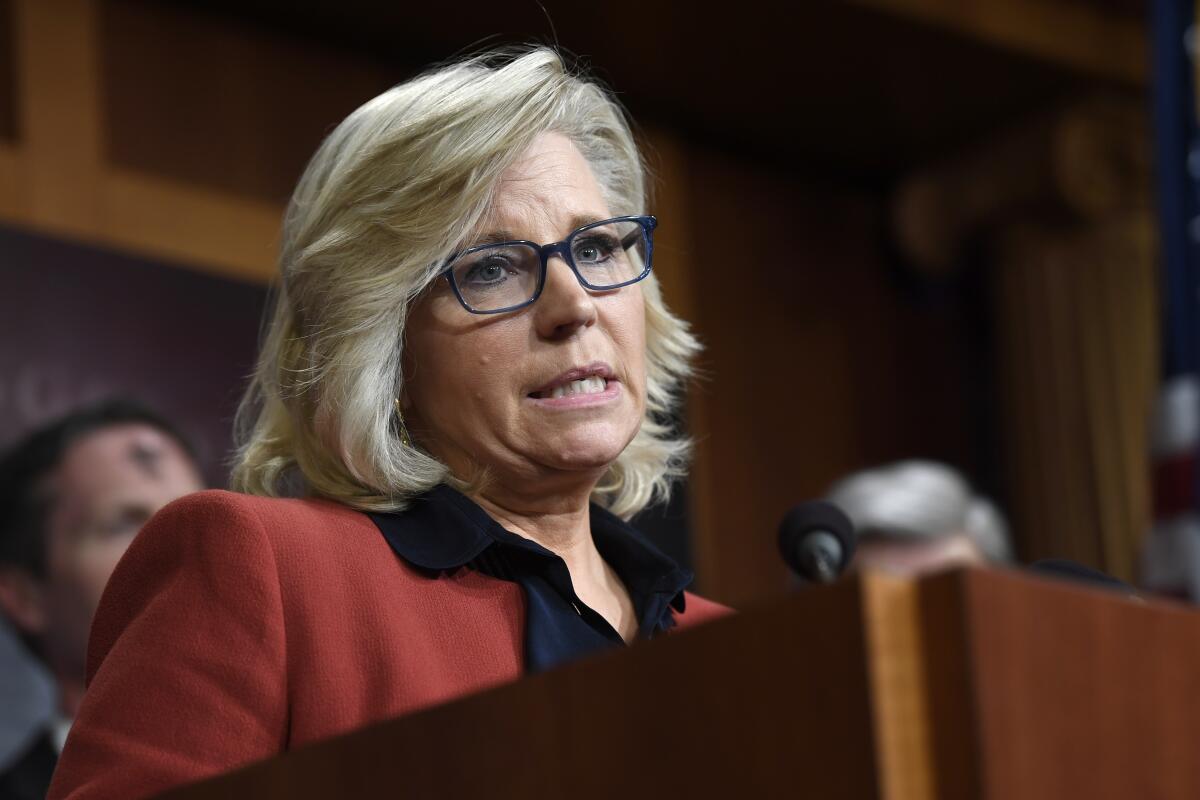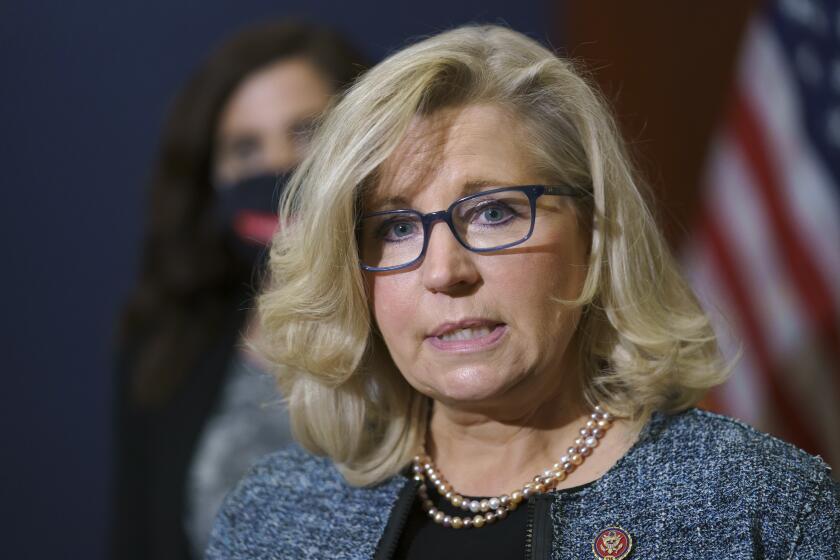Liz Cheney’s ouster from House leadership amplifies voice of anti-Trump Republicans

- Share via
WASHINGTON — House Republicans’ drive to oust Rep. Liz Cheney of Wyoming from her post as conference chair succeeded in eliminating a discordant voice from the GOP leadership, but it also elevated the voice of anti-Trump Republicans — a tiny faction in the House that could emerge as a significant slice of the electorate.
Former President Trump remains overwhelmingly popular with the GOP rank and file, but in some recent polling, his favorability ratings are beginning to erode. Anti-Trump forces, who for years have struggled to gain traction against the resilient Trump, are hoping to expand their ranks enough to be a factor in close elections to come.
“How many of these college-educated suburban voters now look at the party and say, ‘These guys have gone crazy; I no longer have a home there’?” said Sarah Longwell, a GOP political strategist who founded the Republican Accountability Project, an anti-Trump group.
Republicans see a golden opportunity to win back the House and Senate in 2022. But the fight over Cheney highlighted a key dilemma: Trump has a vise-like grip on their party and is well positioned to shape it even more in his image through endorsements in primaries. Yet the more the party mimics his divisive style of politics, the more it risks alienating swing voters in battleground states.
Trump’s impact on the midterm election is already in evidence: Most of the 10 House Republicans who voted to impeach him are facing primary challenges. Some candidates who have been critical of Trump are not running at all. In a special House election in Texas in March, one Republican candidate who ran as a Trump critic, Michael Wood, drew just 3.2% of the vote. The Republican endorsed by Trump, Susan Wright, placed first, landing a berth in the runoff.
“Cheneyesque candidates don’t have a realistic path to winning Republican primaries,” said David Wasserman, an analyst at the nonpartisan Cook Political Report, referring to those who challenge Trump’s lies about the 2020 election. “I’d be surprised if four of the 10 Republicans who voted to impeach Trump in the House are still in office in 2023.”
House Republicans voted to remove Wyoming’s Rep. Liz Cheney, a critic of Trump’s lies about election fraud, from her post as No. 3 House GOP leader.
This escalation of the anti-Trump fight, coming during the formative months of the young Biden presidency, has made it harder for the Republican Party to mount coherent opposition to an administration beset by problems.
“Look at what’s happening on [President] Biden’s watch: inflation, gas shortages, companies can’t fill job openings, border crisis,” said Scott Jennings, a GOP strategist with close ties to Senate Minority Leader Mitch McConnell (R-Ky.). “We have to get focused on pushing back against Biden or we are going to lose this golden opportunity to drive this guy down.”
Many anti-Trump Republicans concede that they have essentially lost the GOP civil war to Trump and that rebuilding without his dominance will be difficult unless the party suffers bruising some electoral defeats. Big political losses in the 1980s and 1990s, for example, cleared the way for President Clinton to steer the Democratic Party to the center, and in Great Britain for Tony Blair to redirect his Labor Party.
“The Republican Party is at a point now where they have to be defeated again and again at the polls,” said Peter Wehner, a former aide in the George W. Bush White House and longtime Trump critic. “Until that happens, I don’t think there’s much chance of the Republican Party being revitalized.”
Some Trump critics — like GOP strategist Bill Kristol, who backed Biden in 2020 — have thrown in with the Democrats. Others have threatened to start a third party — as did a statement Thursday from a group of more than 150 Republicans, including four former governors and 27 former House members, many of them throwbacks to another, less polarized era in American politics. Trump dismissed the statement as a missive from “losers.”
But Cheney is offering a third approach, calling for Republicans to redirect their own party from within. She brings to the fight the cachet of a solidly conservative record and a respected political lineage, as daughter of former Vice President Dick Cheney.
In a marquee interview with NBC’s “Today” show that aired Thursday, Cheney made plain she is remaining in the Republican Party, will run for reelection in 2022, and plans to beat back any primary challenger Trump chooses to support — a primary election that will be perhaps the starkest, most personal referendum on the influence of the former president in the midterm cycle.
Cheney has left open the door to someday running for president, as implausible as that may now seem with Trump support still so high. On Friday, she pointedly took her message to New Hampshire — host of the first presidential primary every cycle.
Asked about her presidential aspirations Friday morning on a local radio talk show, “New Hampshire Today,” Cheney said she was “not ruling it in or out,” adding, “What I’m focused on right now is helping to rebuild the party.”
“For the Republican Party to be able to prevail we have to attract back voters who left us in 2020,” Cheney said. “To do that we’ve really got to be willing to take a hard look at what happened in 2020.”
Rep. Elise Stefanik of New York was chosen Friday, by a vote of 134 to 46, to succeed Cheney as House Republican Conference chair.
Stefanik immediately sought to turn attention away from GOP divisions and on to attacking the Democrats: “House Republicans are united in our focus to fight on behalf of the American people to save our country from the radical socialist Democrat agenda of President Biden and Nancy Pelosi.”
She also reiterated her support for Trump’s role in the party: “Voters are unified in their support and their desire to work with President Trump, and we are unified as Republicans.”
Stefanik, whose voting record is more moderate than Cheney’s, beat Rep, Chip Roy of Texas, a conservative who argued that she was not conservative enough to lead the conference. But with the backing of Trump, House GOP leader Kevin McCarthy of Bakersfield and other top leaders, Stefanik’s victory was a clear demonstration of how loyalty to Trump has taken priority over ideology as a litmus test for the party.
Republicans are favored to win control of the House in 2022 because Democrats’ majority is very narrow, several incumbents in competitive districts have announced they are not running for reelection, and historically the president’s party loses seats in the first midterm election. Democrats’ woes will be compounded by the post-census redrawing of district lines, a process in which Republicans have the upper hand in many state legislatures. And a growing number of states are imposing new voting restrictions that could undercut Democratic turnout.
But Trump’s problems did not begin with Cheney and will not end with her ouster from leadership. His standing, while still sky-high among Republicans, is weakening around the edges, according to an April NBC News poll. In the survey, 55% of “soft” Republicans — those who are inclined to vote Republican but not strongly so — had positive feelings about Trump, down from 75% in January. Among independents, the share of those with positive feelings cratered, dropping from 37% to 14%.
The Republican Party’s own internal polls reportedly found that in battleground districts where control of the House will be decided, Trump’s unfavorable ratings are 15 points higher than his favorable ratings.
In the Senate, some Republicans worry privately that Trump will throw his weight behind candidates who are not the best suited to win or that his endorsement will make them less appealing to a general electorate in competitive states.
In Georgia, Trump has said he would like former football star Herschel Walker to run against Democratic Sen. Raphael Warnock in 2022. Walker has clear political vulnerabilities: He is a political novice and a Texas resident. But with the prospect of a Trump-backed celebrity running, other potential GOP candidates have stayed on the sidelines.
In Virginia, which is holding a gubernatorial election in 2021, Republicans just nominated Glenn Youngkin, a former private-equity executive who has embraced Trump’s effort to cast doubt on the legitimacy of Biden’s election. Trump immediately endorsed Youngkin, and Democrats are hoping that will be more liability than asset in the blue-leaning state.
Despite their internal divisions, Republicans agree on one thing: that their best shot at beating Democrats in the midterm election will be to focus on the foibles of the Biden administration and on an agenda they portray as overreaching and borderline socialism.
Republicans hope they can now regroup as an opposition party.
“I think where we go is to try to make the issue what the Biden administration is doing, where we disagree with the president, and not trying to go much beyond that,” said Rep. Tom Cole (R-Okla.). “I think that’s where we’re trying to get to.”
Times staff writers David Lauter and Jennifer Haberkorn contributed to this report.
More to Read
Get the L.A. Times Politics newsletter
Deeply reported insights into legislation, politics and policy from Sacramento, Washington and beyond. In your inbox three times per week.
You may occasionally receive promotional content from the Los Angeles Times.












